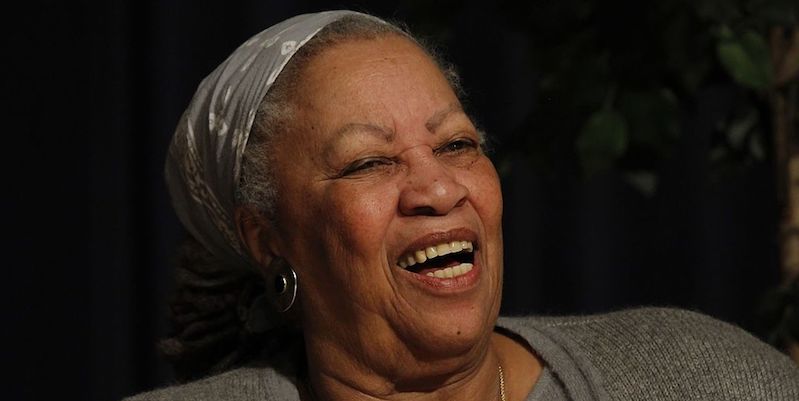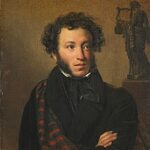Showing Toni Morrison what Beloved meant to me took 20 years.
The first time I ever encountered Toni Morrison in person was at a reading at The Riverside Church in Harlem, in the mid-1990s, not long after she won the Nobel Prize in Literature. I presented her with my copy of Beloved. She shook her head politely, but firmly, and declined to sign it.
Around two decades later, in December 2014, I decided to take a friend up on his invitation to see Morrison receive The Social Justice Award from the New Press at a reception in New York City. I arrived early to the affair, knowing that the event would be packed, given her icon status. Spotting her majestic coif of gray dreadlocks in the back of the venue—who could miss it?—I practically tip-toed my way toward her. I clutched my dog-eared copy of Beloved, the same copy as 20 years prior, which I had owned since my junior year at Wesleyan University. I sheepishly asked her, “Would you please sign this?” She did not grab the book and sign as I hoped. Instead, she suddenly noticed writing in the margins and carefully flipped the pages. I was nervous, mortified even, as she quietly read my scribbles. I’d forgotten that the novel was full of even more notes, post-its crumpled throughout the book. She took her time reading those, too. After what seemed like an eternity, she nodded in approval, shot me a sly smile, and then signed my dog-eared copy.
Afterward, two events provoked me to re-read Beloved. The inauguration of Donald Trump and my near-simultaneous decision to rejuvenate my creative interests are what galvanized my latest read. I had no shortage of political things to say, but was suffering a spiritual and creative block, for January 2017 was the worst month of my life. My dear father passed away. I wrote Pops’ obituary, describing him as a man deeply concerned with democracy and fairness, even as I live-blogged Donald Trump’s inauguration at the request of The New York Times. Hunched over my laptop, I toggled between drafting a loving eulogy for my father, while reporting the investiture of Trump. These dual events, a personal ending, a public beginning, these two elegiac expressions, nearly severed me, each undercutting the other.
The first time I read Beloved, as a college junior, it flew over my head. The next time I read it, as a young hooligan living in the East Village, I could grasp its creative whispers, its social messages—if only tentatively. Picking the novel up again in 2017 with more life experience, I finally got the book—deep in my cortex, instinctively in my blood. It was my fifth reading.
Now, Beloved remains the single novel with increasing resonance to my life, to our complicated nation, to creativity, to parent-children relationships. In fact, my novel-in-progress and I are consumed by the whole conundrum of being a child and a parent, the spiritual hurt of absentee parents, the way that parents have complicated lives before having children, the parents one thinks one has, the parents one might wish to have had, the way that family members go missing on each other, and the way, no matter how tightly a family thinks it is bonded by hardship, parents and children sometimes become more intimately known by strangers than by one another. And more, children don’t know their parents’ ordeals.
Beloved is the novel that required me years to fully understand, but which inspires me in minutes. I am grateful because well before she inspected my notes in the margins, Toni Morrison gave a ragtag group of people like me the permission and inspiration to write—and to continue writing. “There is no time for despair, no place for self-pity, no need for silence, no room for fear,” Morrison once said. She also told us, “If there is a book that you want to read, but it hasn’t been written yet, you must be the one to write it.”
I have no way of knowing whether Morrison was amused by the sophomoric observations noted by my first read, or whether she was curious about the reflections from an increasingly careful reader, not just a fanboy begging for an autograph.
Over the years, I have been heartbroken by the disappearance of print culture, the growing apathy for handsome books, reader markings on sensual pages. So one of my passionate hobbies is collecting signed books. Mine is a joyful, methodic, life-long collection that includes a panoply, ranging from Barack Obama’s autographed memoir to my friend Christopher’s poetry collection, the obscure, anarchist rhymes of a queer punk. But the most cherished of them all is my signed copy of Beloved. I am certain I would not have survived as a reader or writer were it not for its author.





